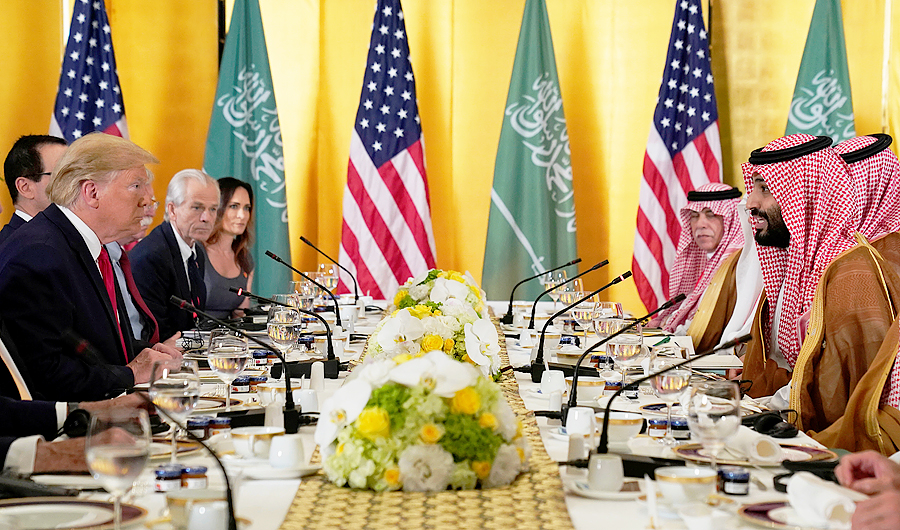OSAKA, Japan: US President Donald Trump on Saturday saluted Saudi Arabia’s fight against global terrorism, and the reform program being driven by Crown Prince Mohammed bin Salman, particularly the empowerment of women.
Trump, referring to the crown prince as a friend, talked of the opening up of Saudi Arabia, “especially what you have done for women,” he told Prince Mohammed.
The Vision 2030 plan was “like a revolution in a very positive way,” the president said at the G20 summit in Osaka, Japan. “You’ve done, really, a spectacular job,” Trump told the crown prince.
Trump also highlighted the significant business dealings between the two countries and the impact on US jobs. “At least a million jobs are created by purchases made by Saudi Arabia,” he said.
“We have had meetings on trade and economic development and on the military, of course, and the meetings have been really terrific.”
“One thing that you are doing, which is almost at the top of the list and probably is at the top of the list is your fight on terror,” Trump said, addressing the Kingdom’s efforts to combat the evils of terrorism and extremism.

Trump praised the crown prince’s reform efforts. (Reuters)
The remarks were made ahead of a closed-door meeting between Trump, the crown prince and prominent ministers and advisers from both countries.
The summit of world leaders closed with a pledge by Prince Mohammed to continue the G20’s work toward global unity at the Riyadh summit next year.
“The need to enhance international cooperation and coordination is more pressing than ever before, considering the complex and interrelated challenges facing our world today,” he said.
He said empowering women and youth remained two key pillars to achieving sustainable growth, and encouraging entrepreneurs and small businesses.
Achieving international co-operation “depends on the ability to strengthen international consensus by establishing the principle of expanded dialogue, and building on the international system based on common principles and interests.
“Enhancing confidence in the multilateral trading system depends fundamentally on reforming the Word Trade Organization (WTO) and working under its umbrella,” he said. Reform of the WTO has been one of the main elements of calls by Trump for a new infrastructure for global trade, a big arguing point in Osaka.
Prince Mohammed called for adequate funding to implement the UN’s sustainable development goals, and urgent cooperation with low income countries in areas such as food security, infrastructure, access to energy and water sources, and investment in human capital.
These issues, he said, would be the focus of attention during the Kingdom’s G20 presidency.
The crown prince said the world lived in an era of unprecedented technological and scientific innovations with unlimited growth prospects, and new technologies such as artificial intelligence” and the “internet of things” could provide the world with an abundance of benefits, if utilized optimally.
“We are trying to do the best for our country,” and we need to do more, he added. Prime Minister Shinzo Abe of Japan said he would work in support of the Saudi preparation plans for next year until he formally hands over the presidency to Saudi Arabia in November.
“I truly hope that strong leadership can be exercised by Saudi Arabia, using the Osaka leaders’ declaration as the platform. I pray for the strong success of the Riyadh summit,” he said in response to a question from Arab News.




























